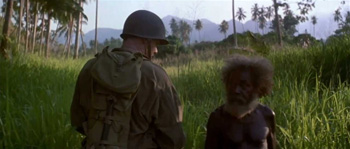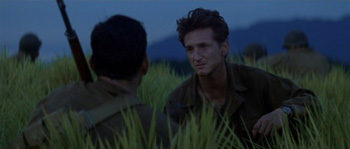5 Oddly Specific Tropes Famous Directors Slip In Every Movie

Directors often revisit the same themes, whether it's the gooey tumors of David Cronenberg, the pointless surprises of M. Night Shyamalan, or the exploding half-naked women of Michael Bay. They all have certain tropes they just slip into everything they do, conscious or not. Here are some that are maybe a bit subtler, but after you notice them, become glaringly obvious.
Terrence Malick Loves Tall Grass So, So Much
Terrence Malick's films divide opinion like few directors working today. Some praise him for his visionary artistic flair and deeply philosophical undertones. Others dislike him for the exact same reasons, because they think those are traits for pretentious assholes. Still others might have fallen asleep during the first 10 minutes of The Thin Red Line, and that's the full extent of their Terrence Malick knowledge. But whether you find his work to be poetic, or pompous, or are still saying "Who?," we can all agree on one thing -- his movies have just a shitload of people running through tall grass.


Malick is always certain to squeeze in as many fields of tall grass as he can. Sometimes at all costs. Because, and this might be hard to believe, not every story involves people running into wheat fields to frolic artistically. Malick loves grass so much that characters in his movies often wander out into a field for no reason, then plop down to deliver a monologue, or finish a bowl of cereal.

A natural place for a bowl.

His most famous movie, The Thin Red Line, is about the Pacific theater during World War II. Most movies on the subject are horrific naval battles, high-speed dogfights, and maniacal samurai sword charges. The Thin Red Line managed to condense all of war into 148 hours of Sean Penn crying in the tall grass.



"Let's pause here and plan our next long stroll through the grass, Sarge."
Every time Terrence Malick makes a movie, the national Lyme disease rate goes up 700 percent. The New World, The Tree of Life, To the Wonder ... maybe you haven't heard of any of these films, but they are each the most beautiful lawn mower commercial you've ever seen. They're like fetish films for people who get off on hay fever.


And if you stare at this image for an hour and 52 minutes, you will have legally seen To the Wonder.
If someone strides through an overgrown field or brushes their hands through some wheat in another movie, critics call them out for stealing Terrence Malick's style. That's how much he loves filming grass -- he basically owns the patent on it. He loves filming grass so much he actually got sued by investors for "forgetting" to make the movie he promised them, because he was too busy cobbling together his nature footage to make a documentary. That's a real story -- the man got taken to court because he couldn't stop filming grass. Call it criminal or obsessive or just weird, but know this -- you will never love anything as much as Terrence Malick loves tall grass.
Christopher Nolan Kills Wives
Christopher Nolan's filmography has shown he's a versatile and imaginative director who can take any subject and turn it into an engaging, unique experience. Something as ridiculous as a man dressed as a bat, or a magical voyage into a dream, become compelling art. He made a rivalry between two old-timey dickish magicians into a thrilling murder mystery. His three-hour movie about dusty corn plants and love transcending the boundaries of spacetime had actual momentum. He's clearly a genius. But that being said, what's with his obsession with starting every story with a dead wife?
There are thousands of ways to give a character a dark and complicated backstory. Maybe they had a criminal past, or an abusive father. Maybe they smell like an ovulating cat's sex glands in a city with poor animal control. Despite the endless possibilities, in a Christopher Nolan movie, a dead wife always haunts the main character. It started in Memento, a film about a man who literally doesn't know a single thing, except that he has a murdered wife. In The Prestige, the Great Danton was trying to ruin the career of a fellow magician who accidentally killed his wife.

Inception is all about a father trying to get back to his kids after his wife frames him for her suicide. Nolan has such a bizarre obsession, he even managed to squeeze it into Batman. He's a character famously defined by tragedy already, but Nolan can only wrap his head around a haunted past if it involves dead wives, not just dead mothers and fathers -- so he tied the love of Batman's life to a chair and blew her up ...

A series of dead wives might be dismissed as lazy writing, but we are talking about Christopher Nolan here. This is the guy who labored carefully to make three layers of nonsensical dream logic work. He's the man who hired a black-hole expert to make sure the physics were right when he dropped a character into a black hole to poke at time-spanning bookshelves. It's definitely not laziness, so what is it? Is divorce too complicated to fit into the exposition? Does Christopher Nolan just think a dead woman is more compelling than a fully formed female character? S- should someone warn the women in his life?
Wes Anderson Really Hates Pets
There are very few directors working today with a more distinct and instantly recognizable style than Wes Anderson. Even before you hear the music, one look at his carefully designed sets, with their bright colors and fancifully dressed characters, and it's obvious. Every frame of Anderson's movies look like the most intolerable hipster couple's wedding photos.
Though if you look past all the whimsy and set design, Wes Anderson films can be terrifying things. Especially if you happen to be furry and four-legged. Almost every single one of his movies features some kind of horrific pet attack. In Fantastic Mr. Fox, Anderson electrocutes a rat, and in The Grand Budapest Hotel someone throws Jeff Goldblum's cat out the window. And the punchline is Jeff Goldblum saying, "Did you just throw my cat out the window?" There's no irony or wordplay in the joke -- the simple act of cat murder is just inherently funny to Wes Anderson. In the pre-teen love story, Moonrise Kingdom, they kill a dog with a goddamn arrow and show its tiny, loyal corpse with that goddamn arrow sticking out of its neck.

Wes Anderson kills another dog with a car in The Royal Tenenbaums, and in Life Aquatic, Jeff Goldblum walks over to a three-legged pooch and smacks it with a newspaper for no reason. He tells it, "Be still, Cody," which is maybe funny because it was already very still? They eventually abandon Cody on Pirate Island, as he tragically runs after their boat. Now that's funny!
It wouldn't be surprising to discover Wes Anderson keeps a hamster in his pocket, so if there's ever a lull in the conversation he can pull it out and snap it in half for a cheap laugh.

There's dark humor in all Anderson movies, and he certainly uses human death to get awkward laughs now and again. But you can at least count on most of the human characters surviving to the end credits. If you see an animal in a Wes Anderson movie, it's five minutes away from being killed during a Kinks song.
John McTiernan Loves Terrible Accents
Before being sent to jail in 2014 for lying to the FBI, John McTiernan was best known for directing two of the greatest action movies of all time, Die Hard and Predator. He directed nine other movies not quite as good, but not being as good as Die Hard and Predator is how a non-moron describes every movie. He made a heist movie (The Thomas Crown Affair), an unappreciated meta commentary on the action genre (Last Action Hero), and a Beowulf reboot with Vikings and Antonio Banderas (The 13th Warrior). His work was all over the place, but the one thing all his films had in common was they all had confrontationally bad foreign accents.
In McTiernan's first movie, Nomads, Pierce Brosnan attempts a French accent that sounds less like a Frenchman talking than it does a Frenchman trying to tie a scarf using only his farts. McTiernan then decided to cast two of the most distinctly English-sounding actors alive, Alan Rickman and Jeremy Irons, to play German brothers in Die Hards one and three. Most movies have the actors work with a vocal coach to perfect their accent before filming, but it seems Rickman and Irons were handed a can of Wolfgang Puck tomato basil bisque and told to talk like it. John McTiernan cared so little about linguistics that he didn't even bother to get German-speaking extras to play the German terrorists. When the actors in the movie speak "German," it's actually vaguely Germanish gibberish.

"Cut; perfect!"
McTiernan also directed The Hunt For Red October, wherein Sam Neill and Tim Curry play Russian submariners with accents like sarcastic Russian actors doing over-the-top Sam Neill and Tim Curry impressions. But at least they tried. Their captain, Sean Connery, filmed the entire movie in his normal speaking voice. In fact, if anything, it seems like he was trying to sound three times more like Sean Connery. John McTiernan doesn't give a shit if his Russian submarine captain sounds like a drunk Scotsman trying to talk your panties off.
McTiernan doesn't just hire actors who aren't great with accents. He hires actors with the most distinct voices possible. If he needs to fill the role of a West Virginia lawyer, he calls Jean-Claude Van Damme, Chewbacca, and no one else. In Predator, he gave the role of an American soldier named "Dutch" to an Austrian man who pronounces every word like two seals having an argument. In The 13th Warrior, the role of Arabian Scribe was given to Antonio Banderas, who was apparently told to make his voice as sexy and Spanish as he could. It's as if every John McTiernan movie hired a casting director who couldn't tell when he was being sarcastic.

Stanley Kubrick's Menacing Stare
Stanley Kubrick had a reputation for being one of the most difficult directors to work with. He had a maniacal attention to detail and, as Shelley Duvall can tell you, he didn't have a problem with torturing actors to get the results he was looking for. But aside from all the actor abuse, he's known mainly for creating psychotic, menacing characters. And oddly enough, each of them menace psychotically in the exact same way. Here, we'll show you:

The "Kubrick Stare" is made up of two distinct movements. First, you tilt your head slightly down. Then, look up at the world from beneath your eyebrows. Try it at home! On the bus! It works with all kinds of activities -- sharpening knives, masturbation, taking notes for your boss ... there's a reason it's in every Kubrick movie.
General Ripper in Dr. Strangelove, Jack Torrance in The Shining, whatever Tom Cruise was called in Eyes Wide Shut ... they all use the same technique to strike terror into the hearts of their co-stars. And it's pretty easy to figure out where Kubrick came up with the move. According to every photo taken of him, it's the only face he has ever made.

It's as if the only note he ever gave an actor was, "Just look at the camera the way I look at fucking everything. You pig fucker hack." We're all lucky. If he was known for his cheery, beaming smile, it would have made a whole lot of those murder scenes even more terrifying.
Barry Scott is a new contributor to Cracked and has a blog for all his petty thoughts, check it out at.
For other things you'll never be able to not notice in movies from now on, check out 5 'Meh' Directors Who Do One Thing Better Than Anyone Else and 5 Bizarre Celebrity Quirks You Can Never Unsee.
Subscribe to our YouTube channel, and check out 4 Directors Who Do the Same Thing in Every Movie, and other videos you won't see on the site!
Follow us on Facebook, and we'll follow you everywhere.